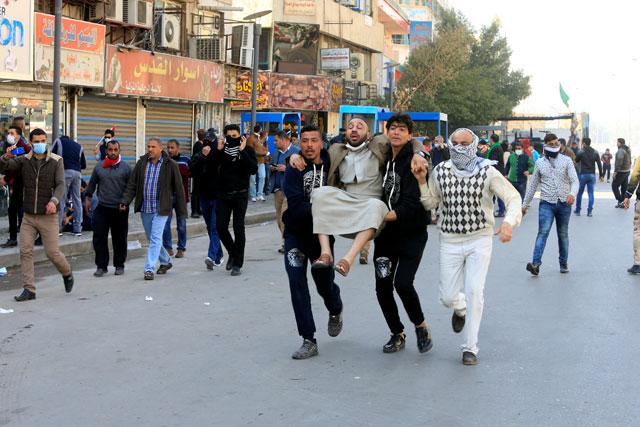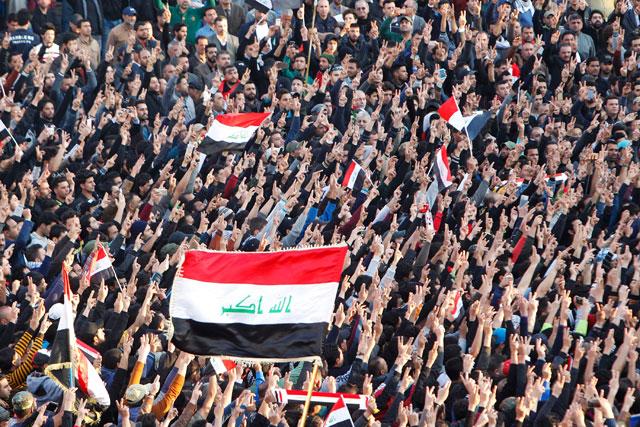You are here
Seven killed as Baghdad protest turns violent
By AFP - Feb 11,2017 - Last updated at Feb 11,2017

Protesters carry a man overcome by tear gas after supporters of Iraqi Shiite cleric Moqtada Al Sadr tried to approach the heavily fortified Green Zone during a protest at Tahrir Square in Baghdad,Iraq, on Saturday (Reuters photo)
BAGHDAD — Seven people were killed in clashes that erupted in central Baghdad on Saturday between the security forces and protesters demanding reforms to Iraq's electoral system, police said.
The violence was the deadliest to break out at a protest since a wave of demonstrations demanding better services and accusing Iraq's political class of corruption and nepotism began in 2015.
Police fired tear gas and rubber-coated bullets at the crowd when some protesters, most of them supporters of cleric Moqtada Al Sadr, tried to force a cordon and reach Baghdad's fortified Green Zone. "There were seven dead as a result of the violence. Two of them are from the security forces and the other five are protesters," a police colonel told AFP on condition of anonymity.
He said more than 200 were hurt in the chaos. Most were protesters suffering from tear gas inhalation, but at least 11 had more serious injuries caused by bullets and tear gas canisters.
Protesters initially gathered peacefully on Tahrir square to demand a change in the electoral law and the replacement of the electoral commission ahead of provincial polls due in September.
"The demonstrators tried to cross Jumhuriya bridge, the security forces fired tear gas to stop them but they insisted," a senior police official said.
Sadr supporters accusing Iraq’s political class of corruption and nepotism broke into the so-called Green Zone twice in 2016, storming the prime minister’s office and the parliament building.
Pressure on Abadi
Last year’s protest movement was halted when tens of thousands of forces launched Iraq’s largest military operation in years four months ago to retake the city of Mosul from the Daesh terrorist group.
However, last month’s announcement that elections would take place in September has brought the political agenda back to the fore, and Sadr’s movement has vowed to increase the pressure again.
Saturday’s demonstrators received a de facto green light to escalate their protest in the shape of a statement from the Najaf-based Sadr.
“If you want to approach the gates of the Green Zone to affirm your demands and make them heard to those on the other side of the fence... you can,” he said.
Sadr encouraged the protesters to remain there until sunset but warned them against attempting to break into the fortified area.
The protesters met fierce resistance from the security forces and never made it across the Tigris River running between Tahrir Square and the Green Zone.
But Sadr, a mercurial Shiite who once led a rebellion against US occupation but has more recently spearheaded an anti-corruption protest movement, urged Prime Minister Haider Al Abadi not to turn a deaf ear.
“I urge him to deliver those reforms immediately, listen to the voice of the people and remove the corrupt,” the statement said.
He later appealed for restraint and the demonstrators dispersed.
Partisan commissioners
Abadi said the violence would be investigated and those responsible for it prosecuted.
“Our action will get tougher, even if that involves physically taking over the commission,” Abu Haidar, a protester wearing traditional Arab dress, told AFP before the rally turned violent.
The electoral commission issued a statement asking for protection from the premier’s office and the international community.
A smaller group of protesters had already demonstrated near the Green Zone on Wednesday, while hundreds also gathered in several southern cities on Friday.
Their two main demands are for the members of the electoral commission to be replaced on the grounds that they are all affiliated to political parties and that the body supervising nationwide ballots was therefore anything but independent.
They also want the electoral law to be amended to give wider representation to smaller parties in the country’s elected bodies.
Sinan Al Azzawi, a popular Iraqi actor, was among those who addressed the protest before the violence broke out.
Politicians “are profiteers and their only loyalty is to the countries they used to live in but not to Iraq”, he said, referring to the Saddam-era exile of many of the country’s current leaders.
“Those politicians, they created an electoral commission based on sectarian quotas. It has nine commissioners who belong to political entities... It’s not independent,” he said.
Related Articles
BAGHDAD — Thousands of Iraqis, mostly supporters of prominent cleric Moqtada Sadr, gathered in Baghdad Tuesday to pay their respects to seve
BAGHDAD — Tension between Iraq's Shiite leaders mounted on Sunday as the toll from protests in central Baghdad on Saturday increased to six
BAGHDAD — Iraq’s parliament should implement the electoral reform called for by protesters, the UN’s top envoy said on Tuesday, days after a


















